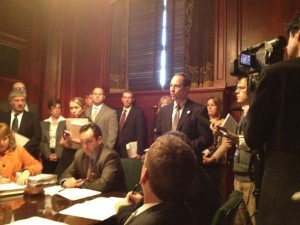Impact Fee Moves Forward, But Plan’s Details Remain Unclear
-
Scott Detrow

Laura Olson / Pittsburgh Post-Gazette
Joe Scarnati explains his bill, during an Appropriations Committee meeting.Laura Olson, Pittsburgh Post-Gazette” credit=”
State Senate leaders are aiming at passing a natural gas impact fee bill by early next week.
The first step toward that goal happened this afternoon, when the Senate Appropriations Committee unanimously approved changes to Senate Bill 1100, which Senate President Pro Tem Joe Scarnati initially introduced in May.
The committee gave the green light to a 61-page amendment, hiking penalties imposed on drillers who violate regulations, and broadening buffer zones between natural gas wells and water sources. The amended language adds transparency to the regulatory process, by increasing the amount of information drillers provide to the Department of Environmental Protection, and hosting those reports on a public website.
For more details on the amendment, check out StateImpact’s annotated copy of the legislation at the bottom of this post.
The amendment has a major catch: it actually strips all impact fee language out of the bill. Scarnati explained the parliamentary tactic is a way to buy more time for Republicans and Democrats to negotiate details of a fee structure. “It is obviously maybe the most divisive, as far as the level of the fee, the type of the fee that is imposed upon, and distribution,” he said. “So in order to give everybody an opportunity to have a fair debate on that, we chose to take it out.”
Scarnati and other lawmakers will continue negotiating the fee’s details through the weekend, and aim to roll the new language out by Monday. Governor Corbett’s proposed impact fee lines up with Scarnati’s preferred approach in many ways, including the amount of money charged per well, and how much money is distributed to counties, municipalities, and the state.
The main difference is who imposes and collects the levy – the county or the state. Corbett wants the decision of whether or not to impose a fee to remain on the local level, while most lawmakers would like to see the state set a standardized rate, and collect the revenue. Scarnati stayed vague on which method would make it into the final bill, though he did note he met with Corbett for an hour on Monday, to discuss the legislation’s details.
Democratic leaders are working closely with Scarnati and other top Republicans to reach a consensus on the plan, though both Minority Appropriations Chair Vince Hughes and Allegheny County Democrat Jim Ferlo made it clear their “aye” votes today were cast to move the process along, and not as a sign of support for the plan.
One likely sore spot is Scarnati’s proposal to bar municipalities from receiving impact fee revenue, if they impose strict ordinances on drillers. Today’s amendment left the “model ordinance” section intact. Under the Scarnati plan, the Public Utility Commission would draft a statewide standard for local regulations. If a township surpassed the model ordinance, it wouldn’t get any revenue. Scarnati acknowledged the proposal has received harsh criticism.“You know, we’re trying to work through a plan here that still gives locals – and I believe they should have – autonomy in deciding what goes on within that community,” he said. “Yet some consistency across the state. So we’re trying to strike a balance there, and we’re certainly trying to keep townships out of court.”
















